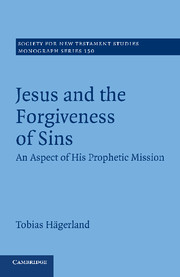Book contents
- Frontmatter
- Contents
- Tables
- Acknowledgements
- Abbreviations
- 1 Introduction
- 2 Forgiveness in the gospel tradition
- 3 Forgiveness and primitive Christian theology
- 4 Mediators of forgiveness in early Judaism
- 5 Forgiveness in the mission of the historical Jesus
- 6 Forgiveness from Jesus to the Gospels
- 7 Conclusion
- Bibliography
- Index of passages
- Index of modern authors
- Index of topics
3 - Forgiveness and primitive Christian theology
Published online by Cambridge University Press: 05 December 2011
- Frontmatter
- Contents
- Tables
- Acknowledgements
- Abbreviations
- 1 Introduction
- 2 Forgiveness in the gospel tradition
- 3 Forgiveness and primitive Christian theology
- 4 Mediators of forgiveness in early Judaism
- 5 Forgiveness in the mission of the historical Jesus
- 6 Forgiveness from Jesus to the Gospels
- 7 Conclusion
- Bibliography
- Index of passages
- Index of modern authors
- Index of topics
Summary
The arguments of scholars who deny that the historical Jesus forgave sins can, somewhat simplistically, be grouped together in two basic hypotheses. According to the first hypothesis, which dates back to Bauer, the Gospel episodes reflect a tenet of christology: the risen and living heavenly Christ forgives sins. According to the second, originally proposed by Bultmann, the rationale is ecclesiological: primitive Christians sought to anchor their own authority in the earthly life of Jesus. Either hypothesis will gain plausibility only if it can be demonstrated that primitive Christians did harbour these christological or ecclesiological convictions, and if it can be shown that they were likely to express them in the form of narrative about Jesus. It is therefore remarkable that no thorough investigation of the topic of forgiveness in primitive Christian literature seems to have been made. The present chapter seeks to fill the gap by reviewing the topic as treated in all extant sources of primitive Christianity up to c. 135 ce, whether canonical or non-canonical, (proto-)orthodox or (proto-)gnostic.
Methodologically, what will be tested in this chapter is the applicability of the criterion of discontinuity. As pointed out in Chapter 1, this is to be understood as pertaining only to the question of continuity and discontinuity between Jesus and Christianity. It cannot be demonstrated beyond doubt that primitive Christianity as a whole did not view the risen Jesus as the forgiver of sins, but it may be demonstrated that the evidence that primitive Christians did do so is far too meagre to allow any hypotheses to be built on that foundation. To avoid circular reasoning, the Gospels will normally be bracketed out from the material considered. Exception from this rule will only be allowed for some Gospel material that seems clearly to point beyond the narrative time frame of the life of the earthly Jesus: the synoptic missionary discourses and the commissions in John 20.19–23; Matt 16.13–20; 18.15–20.
- Type
- Chapter
- Information
- Jesus and the Forgiveness of SinsAn Aspect of his Prophetic Mission, pp. 85 - 131Publisher: Cambridge University PressPrint publication year: 2011



